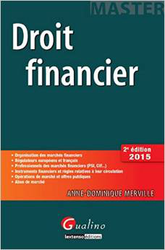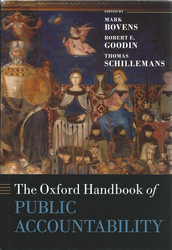The recent news
Dec. 4, 2014
Breaking news

When one likes the "Financial law," one is delighted to open the second edition of the Droit financier (Financial Law), Frenche book written by Anne-Dominique Merville and publishes at Gualino - Lextenso édition (392 p.).
Indeed, the reader learns the most recent technical rules. If it is difficult to know "Financial law" this is because it doesn't really constitute a "branch of the law." It seems an accumulation of laws, rules, decisions and soft law adopted to serve the financial market.
Significantly way, in the book construction, there is no place especially for the "financial Regulation" while itsTitle II is about " Les régulateurs des marchés financiers" (The financial market regulators). This suggests that the financial regulatory system is primarily due to the regulatory body. This is maybe true.
Reading developments, it is observed that the European Central Bank is listed among "The financial market regulators".
For my part, for several years I do think that a central bank is a regulator. But as it is currently a supervisor and that there is a fundamental distinction between regulation and supervision. It's why it is necessary to demonstrate the transition from one to the other or intimacy between them, to affirm so easily that a central bank, monetary authority, is a financial regulator.
Yet the author assume acquired, showing that the qualification is already in the mind. The development will come after. It will impose yet because this change of qualification has important consequences. It involves jurisdictionalization of Central Banks that we still do not know and have not conceived.
Dec. 3, 2014
Breaking news

Available in several languages, the document is titled: Dynamic telecoms market requires modern legal bases.
The consultation document intends to proceed with a progressive review". A first step of review will take place late 2015.
Operators have already protested about the narrowness of the consultation, in particular because the issue of optical fiber is not asked!footnote-5.
Dec. 2, 2014
Breaking news

Internet requires regulation. It does not works solely because of the moral sense of the users or through vigilance of companies that develop on it.
The regulator of the virtual space can be imagined, or a regulator of the various possible activities that develop there, regulators then deploying their powers as when the activity takes place on the Internet. Thus, it is the case of advertising.
In the UK, the Advertising Standard Authority (ASA) monitors the advertising business, also on the Internet.
Its decision of 26 November 2014 is remarkable for several reasons. It punishes two non-professionals, namely two users Youtube tool. But in communication, non-market entrepreneurs sometimes have more weight than businesses. But on the Internet, users can sponsor their free activity, which is to monetize. In this case, the two had played on their Youtube channel short films that were advertisements.
The complaint made against them is that Youtube is not a support on which those who put content make it to commercial purposes. And other users could not understand they watched the advertisement and not a distraction film or information.
The Regulator imposes a sanction against Internet users not because they did a promotional contract with the company, in this case Cadbury wich wants to promote Oreo cookies. By this contract, the entreprisee via the famous Internet users can reach consumers, which is permissible. They are punished because they have deceived the confidence of the other Internet users who can't imagine being the target of an advertisement. The fact that it is people with many fans on youtube counted in the severity of the Regulator. Indeed, they have more than 2 million subscribers. More than 1.3 million have seen the offending video. Only 243 people have not loved it.
Dec. 1, 2014
Breaking news

However, France and Germany have asked 27 November 2014 to the European Commission to take steps against those who hold the platforms on the Internet, including search engines. Everyone knows that this is the famous "GAFA" (Google, Apple, Facebook and Amazon).
It seems that the EU institutions fit, since the European Parliament voted on November 27 a text saying that it could ban these companies to monetize their platform activities themselves.
By their regulatory perspectives, Europe gets "retrograde" against the US dynamism?
At first glance, one might say. But it may be that these companies have become "critical", they take the heart of the digital economy, or even the knowledge economy and social cohesion. In such cases, the regulation of these objective phenomena justifies intervene directly in companies in which the social group comes to identify itself. If the company comes to stifle others, it is not that it stifles competition only, but innovation and free expression.
Then pass the mere vigilance competition law instruments of regulation, common in banking and financial law, such as transparency requirements.
This demonstrates Regulation and Supervision meet when companies become crucial.
Dec. 1, 2014
Thesaurus : Doctrine
Complete reference : Malecki, C., Publication de la directive RSE ou comment faire confiance à la gouvernance d'entreprise durable, Bull. Joly Société, 1st Dec. 2014, p.732 s.
Nov. 29, 2014
Thesaurus : Doctrine
Référence complète : Giraud, A., Exégèse de l'arrêt Groupement des Cartes Bancaires, RLDA, n°98, nov.2014, p.43-48.
Lire une présentation de l'arrêt et des conclusions de l'avocat général.
Les étudiants de Sciences po peuvent accéder à l'article lui-même par le Drive de Sciences po.
L'auteur rappelle ce cas dans lesquelles les banques membres du GIE ont été condamnées par la Commission européenne, en ce que les nouvelles règles adoptées au sein de ce GIE de gestion du mécanisme des cartes bancaires, qualifiées de "régulation" avaient un "objet anticoncurrentiel", ce qui suffisait à justifier la condamnation des opérateurs (décision de la Commission du 17 octobre 2007). Le Tribunal de Première Instance a confirmé cette analyse par un arrêt du 29 novembre 2012, estimant que la condamnation était fondée, puisque par sa nature un tel accord était "susceptible de produire des effets négatifs sur la concurrence".
Cela est invalidé par la Cour de justice, qui casse l'arrêt et renvoie le cas devant le Tribunal de première instance car le fait que l'accord soit "susceptible d'affecter la concurrence" ne le rend pas "anticoncurrentiel par objet".
Oct. 15, 2014
Thesaurus : Doctrine
Complete reference: GERMAIN, Michel and MAGNIER, Véronique, Traité de droit des affaires - Les sociétés commerciales (Law Treaty - Commercial companies), 21th ed., LGDJ - Lextenso éditions, Paris, 1054 p.
This book is written in French.
On listed companies, see p. 799-1034.
Read paperback.
Read the table of contents.

